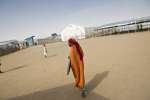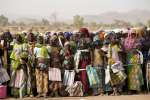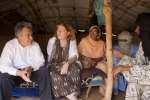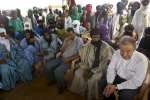Plenary meeting of the UN General Assembly "Global awareness of the tragedies of irregular migrants in the Mediterranean basin with specific emphasis on Syrian asylum seekers". Remarks by António Guterres, United Nations High Commissioner for Refugees. New York City – 20 November 2015
Statements by High Commissioner, 20 November 2015
Mr. Secretary-General,
Mr. President,
Distinguished Delegates,
The number of people who have crossed the Mediterranean to Europe this year now stands at almost 850,000 and keeps growing very quickly. This movement is getting far more media attention than any other humanitarian crisis in the past few years, but as the Secretary-General said, it is one of many large-scale refugee flows around the world today. Handling the situation effectively requires us to start addressing the root causes of displacement everywhere.
But the topic today is the Mediterranean, and there it is clear that the enormous spike in the number of arrivals in Greece is to a large extent a result of the conflict in Syria, amplified by the impact of massive media coverage and the active campaign by smugglers. That refugee crisis has been growing steadily for years, with now almost 4.3 million registered refugees in the countries surrounding Syria. Many have lost all hope that the fighting will stop soon, and as long as it doesn't, people will continue to flee.
In addition, after so many years in exile, refugees have no more savings left, and living conditions have been deteriorating rapidly. In Lebanon, seventy per cent live in extreme poverty, and in Jordan, the proportion of refugees in urban areas falling below the Jordanian poverty line is 86%. Families are struggling to survive, and half of all Syrian refugee children are not getting any education. All of this was exacerbated by the dramatic humanitarian funding shortfall that caused reductions in food assistance and other support and made many refugees feel that the international community was starting to abandon them.
The humanitarian response system today does not have the capacity to meet even the most basic needs of all the people we are supposed to help, and unless something changes dramatically in the way we finance humanitarian response, more lives will be lost, and more desperate people will see no choice but to move on in search of safety and a minimum of human dignity.
One of the key elements of that change should be a much closer link between humanitarian and development interventions, which means bringing development actors – supported by development budgets – in to work with humanitarians from the very beginning of each crisis. Large-scale humanitarian crises can create enormous structural problems for host countries – just look at the huge impact the refugee influx has had on Lebanon, Jordan and Turkey. But these are middle income countries and therefore forgotten or excluded from many instruments of development cooperation. This has to change. We need a fundamental review of the strategies and policies of bilateral and multilateral development cooperation. Refugee hosting countries which are also a first line of defense for all of us in regions troubled by conflict and terrorism must be a first priority in international development cooperation.
Distinguished Delegates,
The other point I want to make is about security, which in many places has dominated the discussion about refugees since the terrible attacks of the last weeks. I have been in Government and I know that every Government hast the strict obligation to care for the security of its own citizens. But let me make it clear that refugee flows are the result of war and terror, not its source. Refugees are fleeing events very much like those of Paris or Beirut, happening in their home towns, every month, every week, for the past few years. And fear and rejection of refugees – especially Muslim refugees – are precisely the wrong answer to extremist threats. This is above all a battle of values. If you lose your values you lose the battle. A Western world that would reject Muslim refugees would provide extremists the best propaganda tool they could wish for in the recruitment of new supporters, including inside the very countries that might close their borders to refugees.
Refugees should not divert the attention from the risks created by homegrown radical movements.
The chaotic movement of people from Greece through the Western Balkans and northwards is also largely the result of the absence of a united and comprehensive European response to the crises. Since the very beginning we have been insisting on the need to put in place the required reception capacity at the points of entry, to allow for the humane and effective accommodation, assistance, registration and screening of the thousands of people arriving every day – to identify those who are in need of protection, those that should be relocated to all other countries in the Union in a fair distribution, and people who do not qualify for refugee protection and for whom effective and dignified return mechanisms have to be put in place. As long as this robust reception and screening capacity does not exist, the only ones who are in control of the situation are the smuggling networks, operating in the open, whose unscrupulous activities have already cost the lives of nearly 3,500 people in the Mediterranean Sea this year. Much more has to be done to crack down on smugglers and traffickers – but in ways that allow their victims to be protected.
We need to provide those fleeing the Syria crises – and others uprooted by conflicts that are no less violent but far less visible – safe, legal alternatives to the chaotic and dangerous smuggling routes they are forced to take today in order to reach safety.
This means more resettlement and humanitarian admission, more flexible visa arrangements, more private sponsorship programmes and other possibilities. Many efforts have been made in this regard, and I very much welcome all the recent announcements by governments that have underlined the importance of this element in addressing the global crisis. But much more is needed, and so UNHCR will be convening a "High Level Meeting on Global Responsibility-Sharing and Other Forms of Admission for Syrian Refugees" early next year, in consultation with the Secretary-General, to mobilize significant additional commitments.
Thank you very much.








































